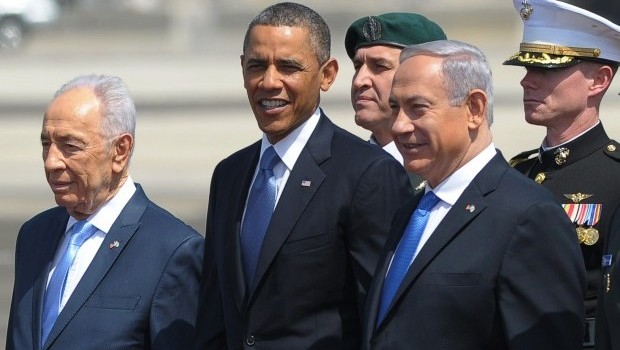
US President Barack Obama (C), Israeli President Shimon Peres (L) and Prime Minister Benjamin Netanyahu (R) take part in an arrival ceremony for Obama at Ben Gurion International Airport on March 20, 2013. (AFP PHOTO/MANDEL NGAN)
Expectations for the trip to Jerusalem, Ramallah and Amman were intentionally set lower than Dead Sea elevation, so it seems overly optimistic to go searching for concrete achievements. But what lessons should informed observers be taking from Obama’s Middle East mission concerning US foreign policy?
First, many observers were stunned by the sudden reconciliation between Israel and Turkey. With Obama listening in, Israeli Prime Minister Benjamin Netanyahu phoned Turkish Prime Minister Recep Tayyip Erdoğan and apologized for the loss of Turkish life in the 2010 Mavi Marmara incident, agreeing to provide compensation and paying lip service to improving humanitarian conditions in the Gaza Strip.
President Obama has been pushing for this apology since 2010, and his persistence on this issue finally bore fruit. That Netanyahu was willing to apologize even after Erdoğan’s recent likening of Zionism to a crime against humanity was particularly unexpected, and points to Israel’s sense of strategic isolation in the region.
Second, while declining to announce any new initiatives on the peace process, the White House did put heavy emphasis on President Obama’s outreach to the Israeli public, hoping that gaining the trust of ordinary Israelis will enable him to work better with Israel’s government in the months ahead. His focus on historic Jewish sites such as the Dead Sea Scrolls and the grave of Theodor Herzl (the founder of modern Zionism) indicated an interest in winning over Israelis by embracing their heritage, and Obama’s Thursday night speech to Israeli youth was clearly a focus of his visit.
Given the president’s hands-off approach to peace process issues in recent years, it was remarkable to see how invested he seemed in persuading Israel’s young adults that the status quo of occupation is unsustainable. However, that message was visibly at odds with the fact that Obama chose not to bring any initiatives with him for breaking the deadlock between Palestinians and Israelis.
Given that Israeli hardliners have been wildly successful in defining the president’s image in Israel, it will be interesting to see whether he continues engaging more in these debates. Astounding new polls show that Obama’s approval rating in Israel may be as low as ten per cent and that more Israelis consider his administration pro-Palestinian than pro-Israeli. This confirms that any display of presidential charm will require sustained involvement and cannot just be a one-time effort if Obama is to improve his image among Israelis.
Third, the US administration has deemed the Bibi–Barack relationship a high-priority issue. President Obama’s schedule called for him to spend a remarkable five and a half hours consulting with Prime Minister Netanyahu, and their meetings on Wednesday and Thursday ran long regardless.
Some think that the prime minister’s new coalition will motivate him to seek better relations with the president of the United States, but if their nine previous meetings did not enable them to bridge the yawning gap between their preferences and personalities, this trip is unlikely to do so either. History has shown that Netanyahu’s standard instincts are to castigate—it would be surprising if he continues to play nice the next time he has a major policy disagreement with the US.
Fourth, John Kerry is now the man to watch. True, he cancelled his February trip to the region when it became clear that Israel’s new coalition would not be ready in time, but if any sort of proposal is going to come out of Washington in the months ahead, it will come out of Kerry’s State Department, not the White House.
Kerry is far more interested than the president in personally getting his hands dirty mediating between parties. Not only did Kerry accompany Obama on his marathon meetings this week, he also conducted meetings before and after the president’s visit to debrief the leaders on both sides.
Fifth, President Obama’s time in Ramallah was most remarkable for what was not emphasized there. The president talked up Hamas’s radicalism, but displayed little interest in either the matter of Palestinian reunification or working to shore up the ceasefire between Israel and militant groups in Gaza.
Although it is understandably difficult for Washington to have a fully-fledged Hamas policy, given that US law forbids interaction with groups designated as terrorists, past experience suggests that failure to invest political capital now to keep this axis calm makes wars like the conflagration that broke out last fall all the more likely.
President Obama reportedly has a very low estimation of Abbas for his refusal to engage in direct negotiations unless a total settlement freeze is in place. Nothing in this visit suggested either a change in Obama’s attitude toward Abbas or that President Abbas is really prepared to change his core demand. In fact, some reporting suggests that Obama is beginning to think about the day after Abbas leaves the scene, instead of how to work with him to achieve peace.
The United States has called on Israelis to reject the status quo, but the real question moving forward is whether Washington will table the sort of serious diplomatic initiative that forces the parties not to postpone the issue indefinitely. Simply getting into direct talks sounds appealing, but without concrete outside proposals on the table it is difficult to envision how progress can actually occur between these two parties. We will just have to see what Secretary Kerry has in mind.
